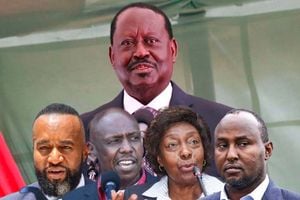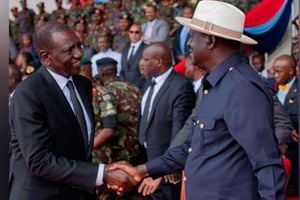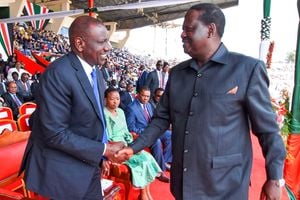
Kericho Senator Aaron Cheruiyot.
Parliament is considering a proposal to repeal the law and make it easier for the President and the ruling party to poach members of the opposition at will without attracting sanctions.
The proposal is contained in the Political Parties (Amendment) Bill 2024 which is currently being debated in the Senate.
If it becomes law, the Members of Parliament, Members of the County Assembly, county governors and even a president can promote the ideologies and interests of rival parties.
This will likely reduce political parties to vehicles of convenience, which members will use for expediency and abandon once their interests are served. Ultimately, this will effectively dilute party discipline — the cornerstone of the country’s democracy.
Although the Bill is a product of the National Dialogue Committee (Nadco) report that was adopted by Parliament in February, it goes against the recommendations of the report in the administration of party discipline for the promotion of democracy in the country.
“The principal Act is amended by repealing section 14A,” clause 6 of the Bill reads.
Its enactment will, for instance, allow the National Assembly Leader of Majority to freely support and propagate the interests and ideologies of the opposition.
The Bill is co-sponsored by President William Ruto’s Kenya Kwanza Alliance and Mr Raila Odinga’s Azimio coalition through the Senate Leader of Majority Aaron Cheruiyot (Kericho, Kenya Kwanza) and Senate Leader of Minority Stewart Madzayo (Kilifi, Azimio).
The Bill also goes against the views of Azimio, law scholar Professor Githu Muigai, immediate former Busia Senator and ex-Attorney-General Amos Wako and the Office of Registrar of Political Parties, while appearing before Nadco.
Nadco, which was co-chaired by Mr Ichung’wah and Wiper leader Kalonzo Musyoka, was established to reform the country’s electoral sector following deadly protests over the outcome of the 2022 General Election.
Party discipline
Section 14A of the Political Parties Act which is targeted for demolition, clarifies when a member may be deemed to have resigned from a political party.
“A person who, while being a member of a political party, shall be deemed to have resigned from that party if that person forms another political party, joins in the formation of another political party or joins another political party,” the law targeted for obliteration, reads.
It also states that one is deemed to have resigned if they publicly promote the ideology, interests or policies of another political party.
The move by a section of elected or nominated leaders to disobey party rules by purporting to unilaterally collaborate with competing political parties had adversely affected party discipline and national character of political parties,” Azimio made its case to the Nadco team.
“Though it was a constitutional right of any person to join any party, such a person must not be allowed to benefit from a sponsoring party while promoting the interests of a competing party,” Azimio pushed.
The Azimio coalition proposed to the Nadco team the introduction of express provisions in relevant statutes that compelled elected or nominated members who crossed over to another party to seek a fresh mandate from the people by amending Article 130 of the constitution and Section 14 of Political Parties Act.
Mr Odinga’s Azimio also proposed to have specific timelines for expelling MPs accused of “political prostitution.”
This included limiting court processes to 60 days and amending the constitution to compel Speakers of Parliament and County Assemblies to implement the decision of a political party expelling elected members “without leeway within 14 days from the date of receipt of the request by the party.”
This is, however, if the decision was successfully challenged by an aggrieved member in the appropriate judicial process.
The Nadco team in its report, recommended that the constitution be amended “to promote multipartyism and fidelity to Political Parties by entrenching procedures for resignation and deregistration of members of political parties in seeking to ensure party discipline.”
The Nadco report also pushed for a constitutional amendment to provide that a Political Party may enter into a pre or post coalition agreement with another political party or political parties.
Part of the formation of Nadco, was the push by the Azimio coalition led by ODM leader Raila Odinga, for clarity on the punitive measures that included excommunication from sponsoring parties of elected leaders advocating for the interests of rival or other parties.
In so doing, Azimio wanted the deeming principle in the Political Party Act strengthened to eradicate what Mr Odinga called “political party prostitution."
Mr Odinga’s push for the excommunication of members who promote ideals of other parties came after President Ruto lured a section of ODM MPs to his side- to support his Kenya Kwanza administration agenda against the position of Mr Odinga.
So incensed was Mr Odinga that he identified six lawmakers for recall process- Senator Prof Tom Ojienda (Kisumu) and MPs Emmanuel Wangwe (Navakholo), Elisha Odhiambo (Gem), Gideon Ochanda (Bondo), Caroli Omondi (Suba South) and Paul Abuor (Rongo).
The MPs were accused of aligning with president Ruto’s Kenya Kwanza agenda, which included their support of the fallen Finance Bill 2024 against their ODM party’s position.
Remain loyal
Prof Muigai, the Attorney-General emeritus, had told the Nadco team that an MP was obligated to remain loyal to the party that sponsored him or her for the full term of the House.
“If one disassociated from the party, then he or she would be required to seek a fresh mandate from the people,” Prof Githu had told the Nadco team.
Mr Wako, in his submission to Nadco, observed that multiparty democracy in Kenya should be promoted.
“In this regard, if an elected representative advances the interests of another party, he or she shall be deemed to have resigned from the party that sponsored him or her and should therefore seek a fresh mandate from the electorate,” said Mr Wako.
The ORPP had submitted to the Nadco team that the Political Parties Act obligated political parties to observe and subscribe to a Code of Conduct.
ORPP however, noted that the implementation of the Code of Conduct has been hindered by the lack of specific sanctions to be imposed on political parties or party members that infringe the Code.
“The sanctions be included in the Code and the Registrar of Political Parties be empowered to enforce sanctions on both parties and individual party members. That would facilitate enforcement and ensure that there was effectiveness in compliance,” the ORPP submitted to Nadco.
But even as Azimio vouched for party discipline, Kenya Kwanza Alliance in its submission to the Nadco team stated that the choice to belong to any political party was enshrined in Article 38 of the constitution and must be respected.











